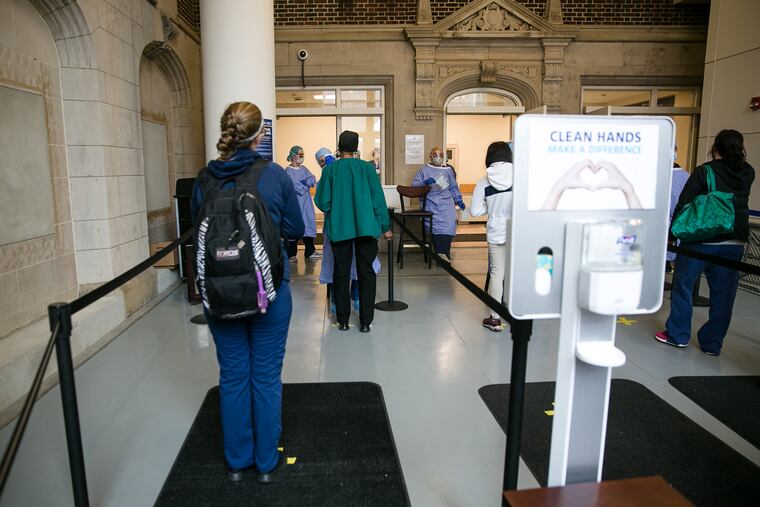Barring visitors from hospitals can worsen patient care during COVID | Expert Opinion
Well-intentioned policies could inadvertently harm more patients than the virus itself.

To limit close quarter contact, and reduce the spread of COVID-19 among patients and staff, hospitals in Philadelphia and around the country have heavily limited or completely barred visitors. Unfortunately, these well-intentioned policies could inadvertently harm more patients than the virus itself.
Preventing in-person visitors can pose obvious problems for patients who regularly rely on caregivers for their health needs, or who become confused while hospitalized (e.g., patients with Alzheimer’s disease). But these policies could also harm a much larger group of patients.
Even informal caregivers are important sources of patient support in the hospital. These family, friends, and loved ones can work with patients to help coordinate and collaborate on their care and well-being. As hospital-based physicians, our experiences reflect these dynamics: loved ones and informal caregivers often play critical roles in our patients’ care.
First, visitors can help promote patient safety. As clinicians, we often benefit from information provided by loved ones about patients’ prior state of health — information that helps us implement safe, effective care plans. Visitors also provide additional sets of eyes, sounding early alarms when patients’ conditions change and confirming when they are improving in response to treatment. Even with established policies and procedures, medicine is a fundamentally human endeavor, and loved ones promote optimal care by ensuring that medications are given on time, and tests are not missed.
» READ MORE: Fear of seeking care in hospitals overwhelmed by coronavirus may have caused thousands of deaths
Second, loved ones can participate with patients on important medical decisions. For example, patients admitted for severe infections can become emotionally overwhelmed by their illness. This makes processing information related to medical decisions about antibiotics or procedures challenging. Loved ones often serve as trusted decision-making partners and advocates, helping patients make choices that are best aligned with their values and preferences.
Third, visitors can help hospitalized patients heal and recover. Far too frequently, isolation from loved ones can prevent our patients from recovering from their illnesses during their hospital stays like we would otherwise expect. Some patients are so lonely that they would rather risk harm and leave the hospital too soon to be with loved ones. Having visitors can make a major difference in patients’ ability to work toward recovery.
To be fair, aspects of these problems predate the pandemic. We have always had patients who, for one reason or another, lack the support of visitors in the hospital. When loved ones cannot physically visit, we can also obtain information from them via phone or video. Nonetheless, never in our careers has patients’ separation from loved ones been as widespread as it is now, affecting all patients across all conditions as a result of hospital policy. And as helpful as it is, technology cannot fully replace the benefits of in-person support.
To meet these unprecedented challenges, hospitals are empowered to make changes. They could tailor visitor policies based on medical illness, visitor type, and local COVID case burden. Along with those dependent on formal caregivers, patients with cognitive or development deficits should be allowed to register loved ones living in the same household. Visitors would still receive temperature and symptom checks upon entry, agree to remain in the patient’s room when on hospital premises, and have to wear a mask. Similar accommodations should be allowed for patients who are vulnerable by virtue of age (e.g., children, the elderly) or clinical status (e.g., confused or unconscious patients).
» READ MORE: Gritty visits HUP to thank health-care workers
Additionally, hospitals should implement policies based on local COVID transmission: hospitals in areas with surging cases should have more stringent visitor policies while those in areas with limited cases and community spread could relax restrictions. In either case, visitor policies could be augmented by additional measures, such as prescheduling, grouping, and rotating visitors throughout the day.
Some local hospitals have begun to incorporate these approaches into policy. For instance, hospitals within Penn Medicine have adopted different policies that reflect local circumstances, with some sites permitting visitors for all patients and others retaining restrictions alongside accommodations for high-need patients. At Jefferson Health, hospitals have transitioned to permitting one visitor per non-coronavirus patient, with exceptions for children and patients with developmental disabilities or cognitive impairments. Importantly, these revised policies still require adherence to safety measures (symptom screening upon entry, masking).
These measures are not meant to return hospitals to pre-COVID policies. Caution will be required for some time, as we continue to grapple with waves of viral transmission in the coming months and years. Hospitals should nonetheless ensure that in attempting to reduce COVID-related harm, visitor policies don’t cause more harm through reduced safety, suboptimal decision-making, and poorer recovery in the hospital.
Amol S. Navathe is the codirector of the Healthcare Transformation Institute and an assistant professor of health policy and medicine at the University of Pennsylvania. Joshua M. Liao is the director of the Value and Systems Science Lab and an associate professor of medicine at the University of Washington.